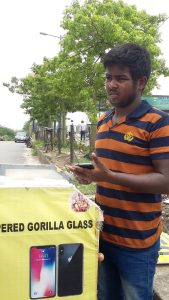People of Bharat: Mukesh, Lucknow

Hazratganj is the most unique tourist spot of Lucknow. With its unique architecture and uniformly painted shops, this place speaks much of its heritage. It is the main shopping area situated at the heart of the city and dates back to 1827, the year in which its foundation was laid by Nawab Nasiruddin Haider. After the First World War, the British rulers took over and remodeled ‘ganj’ to replicate London’s Queen Street, demolishing Mughal buildings to build new European style structures.

It’s a regular evening as locals come out for ‘ganjing’. Amidst the well-lit street, a spot, just outside a mall in Hazratganj, stands a boy with a box-like shelf. He is wearing a striped T-shirt over faded jeans. A flex banner covers the front part of the shelf. It reads, ‘Tempered gorilla glass covers at just Rs. 50.’ A lemon stringed together with chilies hangs on one end of the shelf. This tiny stall is run by Mukesh Modi, who at 19 years earns a living putting screen guards on smartphones.
I have observed that stalls like Mukesh’s are common and can be found on other busy streets of Lucknow as well. A woman erects a two-wheeler and walks over to the stall. She brandishes a smartphone and asks if he has the screen-guard for it. Mukesh turns around to his customer — ‘Defnitely madam’ he replies, rummaging through his stock.
Mukesh was born in a village near Gazipur in Uttar Pradesh. He remembers a childhood spent running around barefoot, across the green fields. ‘The smell of the air is still in my lungs’ he says, recalling memories of a lost time. His father owned a small piece of ancestral land on which the family raised six cows — their main source of income. Mukesh lived in a kuccha house with his parents and three brothers. ‘The cows lived in the courtyard of our house. They were a part of our family. They gave us ample milk and we were happy’, explains Mukesh. Tragedy struck when the cows fell sick. Their milk dwindled and one night two cows died. ‘Everyone in our family wept that night,’ says Mukesh. Fearing the worst, Mukesh’s father made the decision to sell everything in the village and come to the big city to look for work. Mukesh was 9 years old when his family migrated to Lucknow.
It’s been a decade since the family has been living on rent in a house with two rooms in the Jugali area. Mukesh’s father worked as a sweeper for a few years before starting a small paan shop (betel shop). Mukesh’s elder brother followed his father and opened his own paan selling shop close by. Mukesh, disinclined to study, started working as a tea-seller’s apprentice at the age of 12. Few years later he assisted his father in his work. ‘Tabh kamaana zaroori tha (It was more important to earn back then)’ he says trying to reconcile with the conflict of quitting school.
About a year ago, Mukesh’s friend started a screen guard business. Mukesh thought it was a good idea and learnt about the business by accompanying his friend for three months. To begin with, he cleans the screen of his customer’s mobile and then carefully unpacks a screen guard. ‘I have to be careful to avoid trapping air spaces’ he explains as he demonstrates his work to me. His monthly income ranges from Rs. 9–10,000 — he makes Rs. 300–450 daily. He doesn’t frequent one place but moves around the city. He has no vehicle and depends on public transport to get from one place to the next. He makes a trip to his supplier in Naka Hindola area and buys screen guards in bulk every three days. Each trip costs him close to Rs. 2000. He does not have a bank account and does not make a written note of his cost, expenses or income. Still, he manages to save Rs. 4000 each month which he tucks into his galla (piggybank) at home.
Mukesh’s father and elder brother take care of the major household expenses. Sometimes, he pitches in too. The household spends Rs. 2–3000 on groceries and Rs. 700–900 on utilities. Mukesh pays Rs. 1000 every month towards the school fees of his younger brother. ‘Padhai ki ahemiyat toh bohut hai’ (Education is so important) he says. Mukesh owns a second-hand smartphone which is currently given for repair. He uses apps such as WhatsApp, Facebook and Tik Tok for entertainment.
Mukesh tells me his family has recently bought a plot of land outside the city. His uncle, a real estate broker, helped to close the sale. ‘We have only one wish now; to build our own house in the coming years.’ As I finish and start walking away, he points to me the direction to his brother’s shop. ‘Do stop there and buy some chocolate paan!’ he calls out. ‘It’s the best you will taste!’ I promise him I will — after all I like chocolate!
This research was developed as part of the Bharat Inclusion Initiative.
